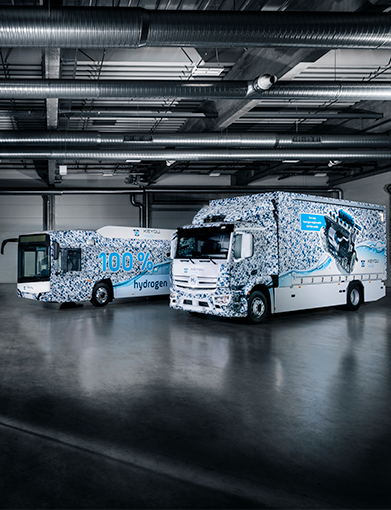
Voith and KEYOU to present hydrogen-driven city bus
A first prototype of the hydrogen-driven city bus will be presented during IAA Transportation 2022
Voith and KEYOU to present hydrogen-driven city bus

Hydrogen is one of the energy sources that will play a vital role in decarbonizing our world. Due to the high energy density of hydrogen, it will also play a key role in transforming the global mobility market. KEYOU, a clean mobility company leading in hydrogen technologies and Voith recently set up a first prototype for a hydrogen-driven city bus, which will be presented during IAA Transportation 2022 in hall 12, stand F60.
The 12-meter vehicle, which is based on the chassis of a leading European bus manufacturer, is equipped with a unique combination of “KEYOU-inside hydrogen engine” and Voith DIWA NXT mild-hybrid system. Development and construction of the vehicle are supported by the Bavarian Ministry of Economic Affairs.
With this step, Voith took a further important step towards its target to play a key role in the global decarbonization of public transport.
Strong partnership for emission-free mobility
Since 2015, KEYOU has been developing H2-specific technologies, components, and combustion processes that can be used to transform conventional combustion engines into emission-free hydrogen engines. The new “green” combustion engine with KEYOU-inside technology means zero emissions, efficiency, and economy at the same time – without compromising on performance, capacity, or range. Vehicles with such engines are considered zero-emission vehicles according to EU standards.
The DIWA NXT automatic transmission for buses is designed as a mildhybrid system. The central recuperation unit (CRU) recovers electrical energy generated from the driving operation. It delivers peak power up to 35kW at 48V. In this very special concept, Voith changed the main functionality of the CRU to mainly support the start-up procedure of the bus. The combination of hydrogen combustion engine and mild-hybrid system thus creates a new zero-emission mobility that can rely on existing infrastructure. The CRU is integrated into the flywheel housing between the engine and transmission and requires almost no additional installation space.

